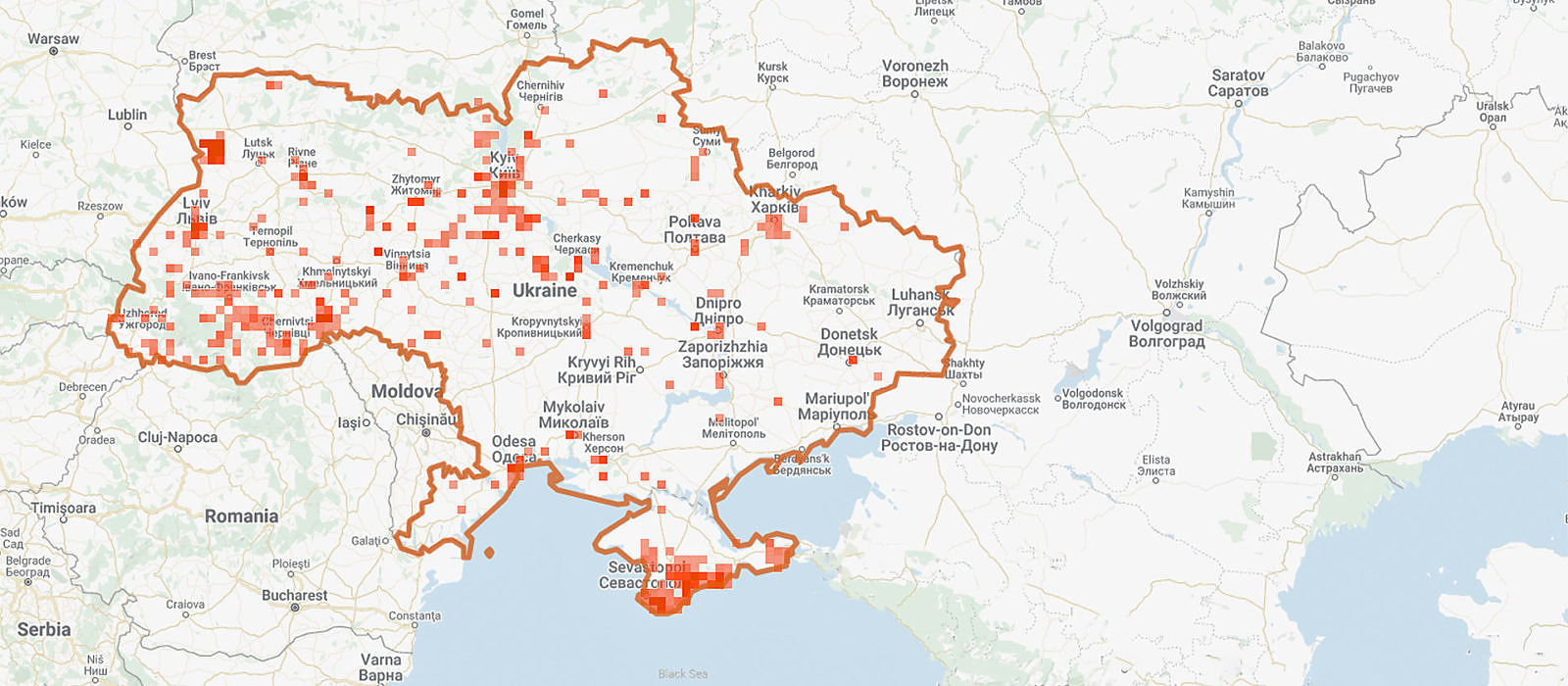
War and Nature
Map Credits: iNaturalist and Google Maps
Preface: Those are not bomb sites in the map above. They instead represent photos from nature — birds, butterflies, flowers, lichens, fungi and other living things — that Ukrainians have been sharing with the world since Russia invaded on February 24 (although they could be bomb sites as well). This essay for The Boston Globe represents my own struggle to reconcile the beauty of spring emerging from the horrific shadows of this war.
On Feb. 24, the day Russia invaded, Mute Swans were moving in to ice-free lakes and ponds for the breeding season near Kyiv.
As rockets struck a train station in Kramatorsk on April 8, killing scores of people, European Peacock Butterflies were on the wing, flashing orange hues and blue eyespots.
And during the siege of Mariupol this week, Sweet Violets were blooming through crusty earth across much of Ukraine.
While most of us witness this war in news reports from the front lines, I have also been watching a poignant spring unfold in photographs of nature that Ukrainians are sharing on an online platform called iNaturalist. Since the war began, more than 300 Ukrainians have posted their photos of plants, animals, fungi, lichens, and other living things. As a biologist here in the relative safety of New England, I’m struggling to reconcile this new life of spring emerging from the horrific shadows of war.
The Ukranian images are by no means the casual or performative manifestations of social media. Launched in 2008, iNaturalist is one of the most important crowdsourced reservoirs of biological data on the planet. Its two million contributors worldwide range from backyard naturalists to research scientists. Since the start of the war, Ukrainians posting to iNaturalist have so far documented the presence of more than 1,300 species: storks and doves, hyacinths and dandelions, lady beetles and bumblebees.
Many share their images because the bombs and tanks have not yet reached them. Others post out of force of habit or a yearning for normalcy, or as a form of defiance. The scientists are driven by the continuing need to gather data for research and conservation. Yet perhaps the most powerful motivation among these biologists and citizen naturalists is that even in war, nature offers us refuge.
…love of nature was a force stronger than bombs.
Oleksii Vasyliuk, a zoologist, told me that for refugees and people in lands under occupation, the familiar — even observations of nature between air-raid alarms — becomes valuable. “Nature inspires those who know how to see it even in the most difficult moments,” he wrote in our exchange of messages through the iNaturalist platform. “In 1918, a well-known Ukrainian ecologist, Professor Pavlo Tutkovsky, said that love of nature was a force stronger than bombs.”
To be sure, many of us find our sense of balance outdoors — in places as magisterial as the Grand Canyon or the coast of Maine or, especially for me, in the company of solitary living things: the ethereal song of a hermit thrush, the elegance of a maidenhair fern, the glitter on a little metalmark butterfly.
After nearly dying of a heart attack five years ago, I took my first walk in the hospital to the window, toward the sunset and the green. When fearful during the pandemic, I found refuge in forests and in bogs.
Nature is not everyone’s respite. We also find escape, comfort, and meaning in music, art, and literature, and, of course, among other people. For the enslaved in America, for Jews in concentration camps, and for Vedran Smailović, who played his cello in the rubble of Sarajevo, music has been a means of preserving dignity and humanity.
Still, I am uneasy with the idea of nature as a transcendent source of beauty and solace in a time of war. Is not my welcoming of spring somehow disrespectful to the victims in Ukraine or to those of the countless horrors playing out elsewhere in the world? Is it valid to treat nature as a lens through which I can express solidarity or empathy?
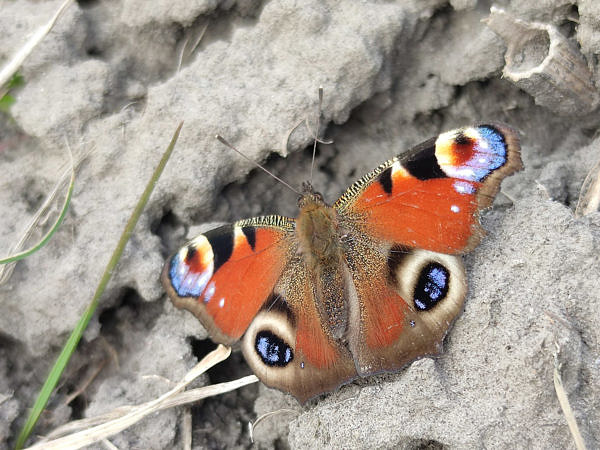
European Peacock / 9 Apr 2022 in Ukraine / © Serhii Koniakin
Nature itself, of course, is dispassionate on the question. Swans unwittingly migrate north among fighter jets. Orchids cannot flee the bombs. Butterflies know nothing of bullets and refugees.
In a way, that indifference and persistence of nature is oddly reassuring to me. Even as we continue to kill one another, and even as wildlife and wild places too become casualties of war, nature remains for us a force of its own, like gravity or faith or love.
Faced with the prospect of death, most of us would not rush to the office, seek to boost our Twitter following, or fret the home repairs left undone. Under threat of war, I suspect, I would try to protect myself, the people I love, and my community — and then I would seek my solace among spring wildflowers and migrating warblers.
Galyna Mykytynets, who studies reptiles and amphibians in Ukraine, told me that she and others had offered support to the Ukrainian military when the war began. Later she fled Melitopol, which fell to Russian occupation, for safety farther west.
“Walking in nature, photographing flowers and animals distracts from the horrors of war and sad news about what the aggressor is doing in our hometown and in other parts of my country,” she wrote (with assistance to us both from Google Translate). Mykytynets added that she would continue to share images to iNaturalist from her current position. “I want to show what a wonderful, rich, and peaceful country we are, what passionate people we have — we deserve independence, freedom, liberty, our choice.”
Our bond with nature, however tenuous now, has been hardwired for as long as we have walked this earth. Even in the face of our ghastly inhumanities to one another, that bond has endured — from when we drew crude paintings of wildlife on cave walls to this time of horrible beauty now shared online in the photographs by people under attack.
Postscript (April 26)
The nature that Ukrainians have been documenting during the war lives here in North America as well. In some cases, they are the same species; in others they are siblings (closely related in the same genus). Although I remain uncertain that this connection is a valid proxy for sympathy and solidarity, I offer you a few examples nonetheless.
Also, not incidentally, the iNaturalist sightings map in the banner above in some ways depicts an absence of violence. Pre-war iNaturalist reports were more frequent in the eastern regions of Ukraine.
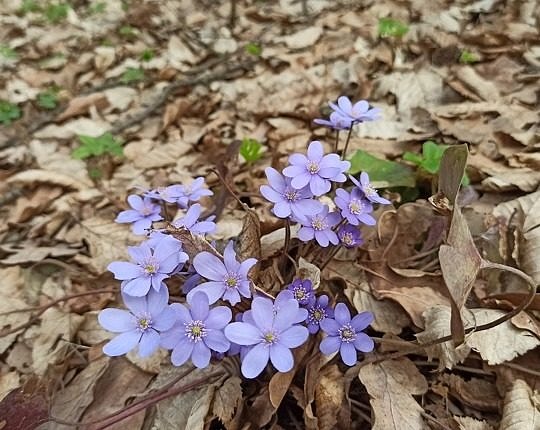
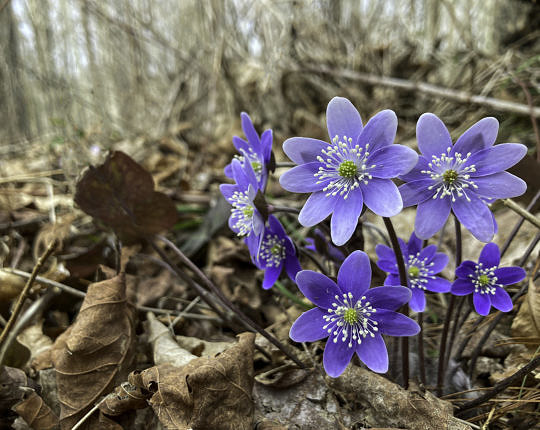
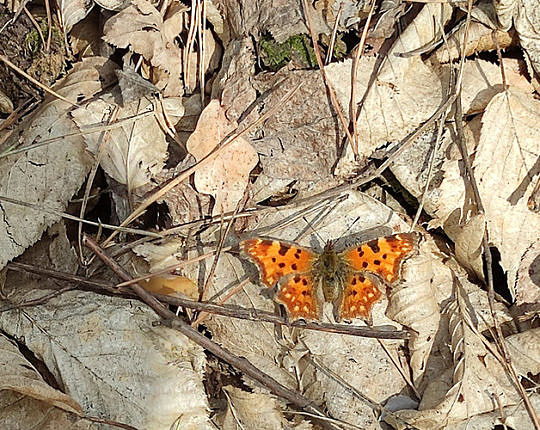
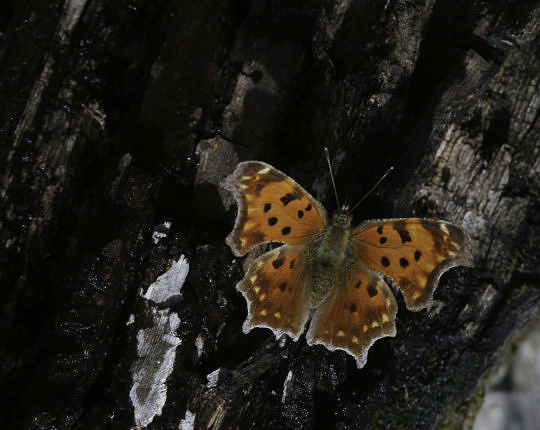
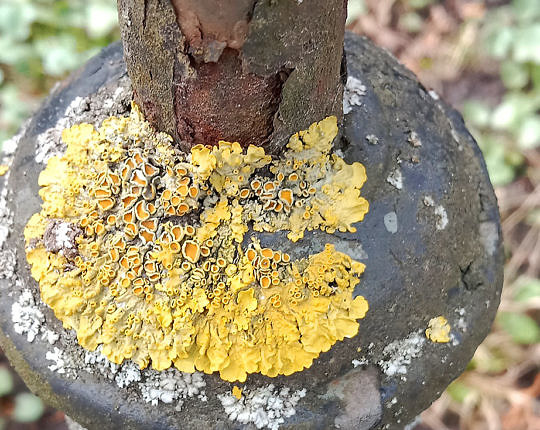
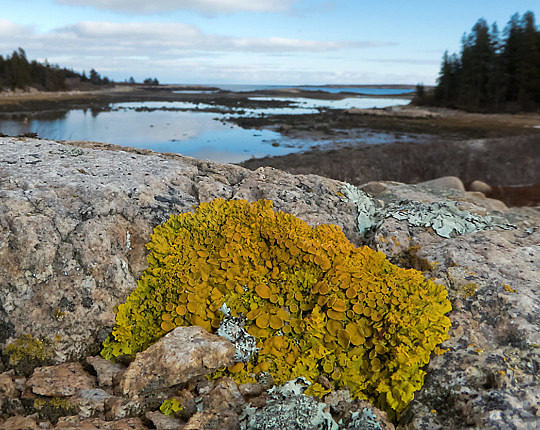
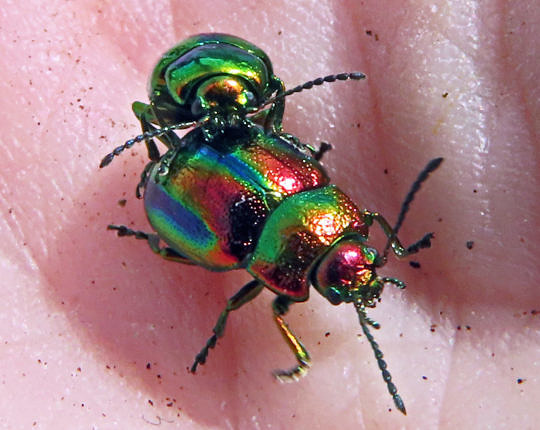
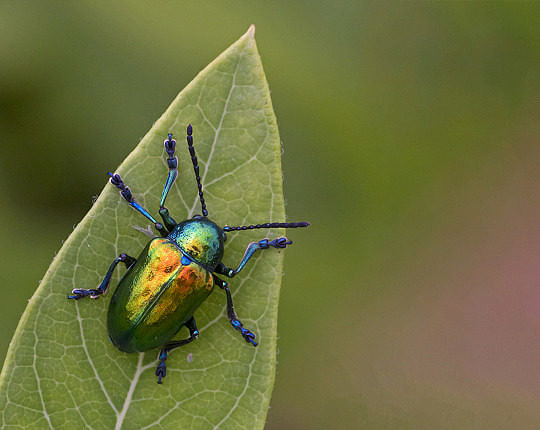

Hi Carolyn,
Thanks so much for your thoughts (and for reading the essay, of course). Yeah, I guess I agree with you. Guilty (again) as charged. But maybe it’s survivor guilt once removed? Since I myself have not faced many threats to my own survival (beyond the routine and, of course, some health challenges).
Nonetheless, this is something I’ve struggled with for a long time — and maybe more than anything I guess I use it (perhaps not as effectively as I might like) to help guide me to action, to think, and to do the best I can in the world. (I often think I don’t do enough.)
Anyway, thanks again. I’m grateful for your perspective. Your timing is fortuitous as well — I recently revised this essay and posted it to my Substack site (where I tend to be writing these days): https://chasingnature.substack.com/
Maybe I’ll keep revising.
Best,
Bryan
Regarding these lines: “Still, I’m uneasy with this idea of nature as a transcendent source of beauty and solace in a time of suffering. Is not my own enjoyment of spring somehow disrespectful to the victims in Ukraine or to those of countless horrors playing out elsewhere in the world?”
This sounds like survivor guilt to me. Throughout history, something horrible has been going on for somebody, somewhere, in perpetual cycle. Individuals who don’t happen to be the ones suffering at a given time have the opportunity, it not the moral duty, to keep on living, to gather and convey and share and comfort those who are not so lucky. Thus, IMO it is *not* disrespectful to enjoy “nature as a transcendent source of beauty and solace” while others are in a bad way. Instead, be grateful you have the chance to do what you do and share it with others, who may rely on you for inspiration, education, and hope.
Helll Bryan
I stumbled across your blog and what a treasure it is. How poetically you have captured the apparent contradiction of blooming flowers and bombs exploding. It immediately reminded me of a beautiful poem by Wislawa Szymborska who also happens to be from that part of the world (Poland). I wanted to share it with you. You will see she had the same conflicting emotion and yet see how she reflects on it…
No Title Required
It has come to this: I’m sitting under a tree
beside a river
on a sunny morning.
It’s an insignificant event
and won’t go down in history.
It’s not battles and pacts,
where motives are scrutinized,
or noteworthy tyrannicides.
And yet I’m sitting by this river, that’s a fact.
And since I’m here
I must have come from somewhere,
and before that
I must have turned up in many other places,
exactly like the conquerors of nations
before setting sail.
Even a passing moment has its fertile past,
its Friday before Saturday,
its May before June.
Its horizons are no less real
than those that a marshal’s field glasses might scan.
This tree is a poplar that’s been rooted here for years.
The river is the Raba; it didn’t spring up yesterday.
The path leading through the bushes
wasn’t beaten last week.
The wind had to blow the clouds here
before it could blow them away.
And though nothing much is going on nearby,
the world is no poorer in details for that.
It’s just as grounded, just as definite
as when migrating races held it captive.
Conspiracies aren’t the only things shrouded in silence.
Retinues of reasons don’t trail coronations alone.
Anniversaries of revolutions may roll around,
but so do oval pebbles encircling the bay.
The tapestry of circumstance is intricate and dense.
Ants stitching in the grass.
The grass sewn into the ground.
The pattern of a wave being needled by a twig.
So it happens that I am and look.
Above me a white butterfly is fluttering through the air
on wings that are its alone,
and a shadow skims through my hands
that is none other than itself, no one else’s but its own.
When I see such things, I’m no longer sure
that what’s important
is more important than what’s not.
Thanks, Ray!
Thanks, Janet. (So sorry for my belated reply.) And … congrats on “retirement!” I wonder what’s next! 🙂
I just found this:
https://www.cnn.com/2022/05/22/europe/ukraine-russia-war-environment-intl-cmd/index.html
Lovely writing, Bryan. The bitter and the sweet. Thank you.
Thanks so much , Georgeann. Thanks for your kindness and caring.
Perhaps no better word than insanity. Thanks, Strat. Best to Gail.
Susan, Oh my, I don’t have a good reply to your kindness — other than gratitude. Thanks to you for reading. Thanks for writing. Thanks for the music. And thanks for sharing it all. –Bryan
For so many reasons, thank you for this post! Because: 1. You and the wonderful knowledge you impart to others makes life meaningful and so enjoyable. 2. Your work connects us to ecosystems around the world and the people who cherish them. 3. In my opinion you represent the best of Vermont and the United States. 4. You are the best kind of teacher – – engaging, approachable, knowledgeable and funny (humor is so important!)
You wrote a beautiful essay and I appreciate your uneasiness about talking about the peacefulness of nature when people are suffering from the horrors of war. But I think you know that what you are offering is like balm for the soul. Nature is the most healing place on Earth. The song of a bird, the graceful float of a butterfly, discovering a little fawn curled up in tall grass, or gazing upon a magnificent snow capped mountain…they all take us to a place of wonder, awe, and unconditional love. That is what you have to offer us. It is a gift! Thank you.
Thanks, Bryan….may all creatures everywhere, and especially in Ukraine, be safe from this insanity…
Thanks again for your thoughtful, sensitive words. I had to wait til the tears stopped to write you. I thought of Sibelius’ Symphony # 5, when he was overwhelmed by the flight of swans overhhead. mute swans…sigh.. Those brave people of Ukraine. I send them prayers. georgeann
By all means, Ray. Thanks!
Thanks, Roger. Every day, iNaturalist seems to be more and more to me to be the best kind of application of internet and community.
Thanks, Ann-Marie. I do hope that the honor and empathy comes through. I’ve tried to express it also in my direct communications with people in Ukraine. Their resiliency is amazing.
Thanks so much, Tom. Yes, at least the “green world heals.”
Thanks, Catherine. So nice to hear from you again. Sending my best your way!
It’s still hard to believe we drop bombs and kill innocent people in order to resolve our differences. Yes, you’ve seen too much of it, Ann.
Thanks so much, Sarah. It’s always nice to hear from you. I hope to bump into you outdoors again soon. 🙂
May I share your piece by posting on my facebook page?
Thank you, Bryan, for your thoughtful juxtaposition of nature and war, and for showing yet another way that iNaturalist can bring people together.
The brave reach out and find joy in discovery. For reaching out and sharing the joy of connection with nature and kindred spirits, written eloquently with honor and compassion- many thanks Bryan.
Lovely article Bryan. It opens a new understanding of the brave Ukrainian people suffering through this horrible war.
Thanks for writing it.
Tom
Footnote: Several springs ago, when I was particularly distressed about the ways of this world, I was walking in the woods and heard a skein of geese calling. It gave me an instant rush of gratitude and I thought to myself: “At least something in this fxxxed-up world still works…”. The green world heals.
Thank you, Bryan — beautiful writing and sentiments as always. And wow, that Postscript — just incredible. We are all connected. Peace to you and yours.
Just thanks! How stupid, this war and all others . . . and I grew up in one.
As always, Bryan, you take me to minute observations of breathtaking beauty and the big, heartbreaking picture at the same time. A rare talent.
Thanks, Wendy. Yes, other ways to be sad — and other ways to share beauty. I’ll admit it is a bit surreal.
Yes, you’ve indeed seen a lot in your days, John. Perhaps more than you care to remember. But now you see and share living things in such beautiful ways. For that I am grateful.
You’re most welcome, Colleen.
This is very kind of you, Ray. Thanks. I’m sending wishes of peace and safety to you and your family. Yes, it’s a bit odd connecting to Ukraine by iNaturalist. My communications with biologists there have been sad and scary and yet affirming. I’m hoping those connections remain for a long time.
Nicely written and very moving Bryan. After my testosterone years were over and Viet Nam a bad memory, I often reflect on the damage we did to the environment. How many tigers , birds, elephants, lichens, frogs and more did I destroy? Impossible to ever know but deeply troubling which launched my “adult” career as ornithologist and naturalist. It’s nice to awaken.
I like Inat but find its competitive features disheartening and absolutely not necessary. Stay well my friend.
We so lucky in our little toy state Thanks for the global perspective.
Because of my struggle with the subject, I’ve never been able to understand how anyone can major in chemistry. You not only managed that, but now you write like an English major.
For two months, I’ve been glued to tv/internet/radio because my Mom’s maternal side (who did not emigrate a century plus ago) are in Western Ukraine. Paternal are in Southeast Poland, not far from where refugees cross border. Tomorrow I’ll begin my day with news from Ukraine via both CNN and iNaturalist
Thank you, Bryan. Beautifully written and very touching. Deep sigh….
Oh, my — you are much too kind. Thanks so much, Carole.
What a kind note. Thanks so much, Lorelei. I’m with you there on the small, simple things in nature.
Bryan, you an emphatic human being, as well as a terrific writer, photographer, and curious observer of the natural world.
This showed up on my FB feed, shared by a friend. Beautifully written, and reminds us all that when we are in times of trouble, fear and grief, that we find solace by taking a long (or short) pause to listen and watch the wonders of nature around us. This is what gives me peace, to hear the sounds by the ocean on Cape Cod where I am now, or listening to the bluebird call to me when I’m out working in my orchard when I’m back home in VT. Thank you for a wonderful piece.
So sad, John. Thanks for reading.
Thanks, JoEllen. I look every day at those sightings from Ukraine.
You’re very welcome, Johanna. Thanks for reading.
Thanks, Kathy. Nice to hear from you. So sad about all this.
Thank you, my friend. Sadly, he bones of the dead all over Europe feed the flowers and crops.
Very moving and insightful observations. I will look at entries in iNat in Ukraine as well. Thank you for this thoughtful piece.
Thank you for sharing!
Lovely, thoughtful article Bryan, I’ve shared it with my FB friends as it deserves a large audience.